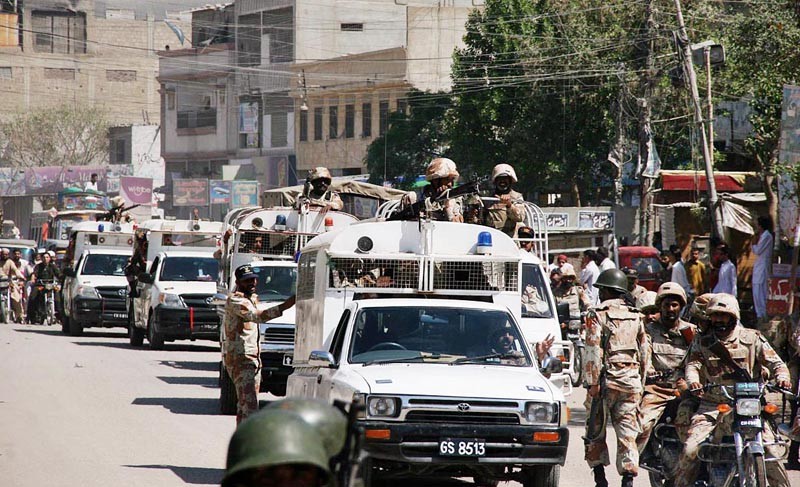

Karachi is facing an escalating political crisis amid growing fury about a crackdown on extortion activities and the extension of paramilitary Rangers. It is dangerous for it has polarised the political climate, over whether the drama, if it can be called so at all, is about the widespread perception that unbridled political corruption is the underlying cause of the city’s many problems or about credibility, trust and legitimacy of power and control over the city of Karachi.
A cause for concern is the Sindh government’s decision to extend Rangers’ term by one month in the late hours of July 8.
Manzoor Isran, a Karachi-based political analyst, thinks that the Rangers mandate is to tackle terrorism, not to act against corruption. "To send Rangers back from the city, the PPP’s provincial government should focus on improving governance and empowering police and other institutions," he adds.
Lateef Mughal, the PPP Karachi’s spokesperson, says that Rangers played a key role in maintaining law and order situation in the city, but they should work within their mandate. "Rangers came to Karachi on the request of the provincial government and their stay has been extended time and again".
But perhaps a cause of greater concern is the recent crackdown on ‘terror financing’ networks that supposedly stimulate violence in the city.
Rangers Sindh Director General Major General Bilal Akbar, in his briefing to the Sindh apex committee on June 4 -- which was shared with media a week later on June 11 -- claimed that more than Rs230 billion is being generated annually from citizens of Karachi through extortion, smuggling of Iranian diesel, water supply and land-grabbing, mainly patronised by ‘a major political party’.
The money collected through illegal means, especially from the state-run institutions and in the form of Fitrana, Zakat and hides of sacrificial animals, also serve militant wings of certain political and religious parties.
The Rangers’ statement has triggered a lot of hullabaloo, particularly within the ranks of the PPP-led Sindh government. It also compelled former president Asif Ali Zardari to lash out at the military establishment for overstepping its domain. And, the MQM has already been under pressure in Karachi and London at the same time.
Naimat Khan, a Karachi-based journalist, who covered ongoing operation extensively, says that the recent developments show that the law enforcement agencies are attempting to smash the financial lifeline of all sorts of militants and criminals. "For such groups, funds are very important to run their activities and they could generate funds either from abroad or Karachi," Khan tells TNS.
Rangers arrested the Fishermen Cooperative Society’s (FCS) acting chairman, Sultan Qamar Siddique, and two directors, Rana Shahid and Muhammad Khan Chachar. All of them were appointed by the ruling PPP. On June 18 they were nabbed for their involvement in corruption and providing funds to criminal gangs in Lyari and its neighbourhood. Its chairman Dr Nisar Morai, a close aide of the PPP’s top leader, left the country four months ago because of fear of being arrested. According to media reports, Rangers briefed the anti-terrorist court that the FCS directors used to forward 70 per cent of collected ‘black money’ to Bilawal House.
The NAB also arrested five officials for alleged involvement in land grabbing and providing financial assistance to terrorists. Looking for a top bureaucrat, the Rangers entered the Sindh Building Control Authority offices. The man they were searching for -- another close aide of the PPP’s chief -- has already left the country.
The Rangers however have taken over the offices of the Sindh Building Control Authority and have collected important documents about thousands of high-rise buildings.
Besides detaining a number of MQM activists in recent months, Rangers arrested a number of its activists for alleged extortion in Karachi’s Rizvia Society neighbourhood on July 2. Responding to the development, the MQM’s Rabita Committee lashed out at the law enforcement agency for ‘creating obstacles in the party’s charity activities’. "Arresting workers for collecting Zakat and Fitrana is an attempt to create hurdles in the way of welfare work," the party’s statement says.
Mughal says all political parties support the Karachi operation mainly against four heinous crimes -- terrorism, targeted killings, kidnapping for ransom and extortion.
The Human Rights Commission of Pakistan (HRCP) has also been showing its concern over Rangers’ stay in the city for a long time and demanding the government to strengthen the police, which is local and proactive and understands the city well.
Asad Iqbal Butt, the Vice-Chairperson HRCP, says it’s not pleasant to see Rangers blackmail the civilian government to extend its stay. "Controlling law and order situation in the city is not the key duty of Rangers and any responsibilities given to them should be temporary", continuing that they have received a number of complaints against the paramilitary forces for their alleged involvement in harassing the people and corruption.